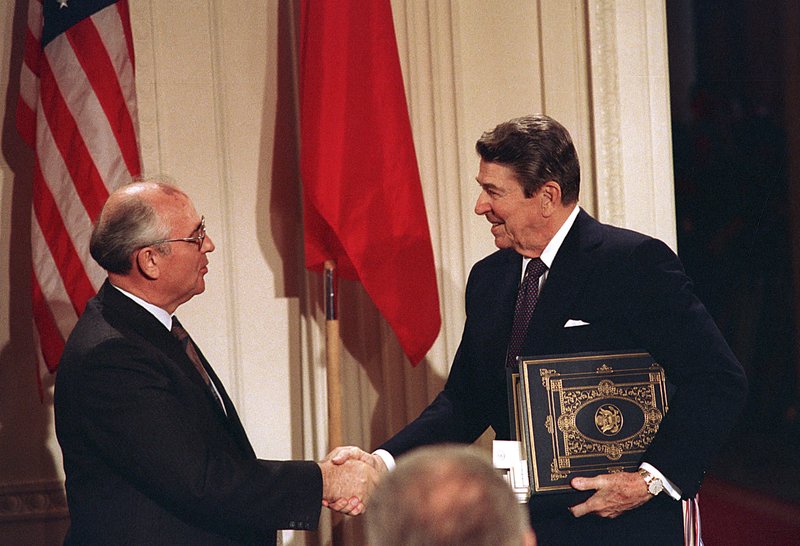WASHINGTON -- The Obama administration's accusation that Russia violated a key nuclear weapons treaty leaves the future of the 26-year-old accord in question and further dampens President Barack Obama's hopes for deeper cuts to nuclear arsenals.
RELATED ARTICLES
http://www.arkansas…">Joining EU, U.S. rolls out new Russia curbshttp://www.arkansas…">Ukraine, rebels trade blame as shelling kills more
The State Department's annual report on international compliance of arms control agreements released Tuesday said the U.S. had determined that Russia is in violation of the Intermediate-Range Nuclear Forces Treaty that President Ronald Reagan signed with Soviet leader Mikhail Gorbachev in 1987.
The treaty says the U.S. and Russia cannot possess, produce or flight-test a ground-launched cruise missile with a range of 300 to 3,400 miles. Possessing or producing launchers for this type of missiles also is banned under the treaty, which helps protect the the U.S. and its allies in Europe and the Far East.
"We're going to hold them to living up to the commitments that they've made," White House press secretary Josh Earnest said Tuesday.
The administration has not said where and when the purported violation occurred, but a Russian official said the concerns date from 2009. The administration, which said it is prepared to discuss the issue with senior Russian officials, raised its concerns about the treaty with Moscow last year.
"It is fair for you to conclude that their response to our concerns was wholly unsatisfactory," Earnest said.
John Tefft, ambassador-nominee to Russia, said he hoped the Russians would negotiate an end to the dispute.
"I hope that the Russians will seize the opportunity ... to meet with our experts, to try to resolve this -- to shelve this particular weapon system and to bring themselves back into compliance with the INF treaty," Tefft told the Senate Foreign Relations Committee on Tuesday.
Russia and the U.S. have had diplomatic relations since the Russian empire, when John Quincy Adams took his post as the first official U.S. ambassador in 1809.
Relations since then have been "long and complex," Tefft said. "We have been allies, and we have been adversaries. We have cooperated, and we have clashed."
Retired Lt. Gen. Yevgeniy Buzhinsky, the former head of the Russian Defense Ministry's international department, said the U.S. complaints of a treaty violation dated back to 2009.
"Now, when an information war is being waged against Russia, the old accusations are being used again," he said, according to Interfax.
Buzhinsky said Russia has had its own complaints about the U.S. compliance with the Intermediate-Range Nuclear Forces Treaty. In particular, he said the U.S. was using its missiles as targets to test its missile interceptors, which he argued is forbidden under the treaty.
Pentagon spokesman Cynthia Smith said the United States remains in full compliance with all its treaty obligations.
The treaty dispute comes at a highly strained time between Obama and Russian President Vladimir Putin over Russia's intervention in Ukraine and Putin's grant of asylum to former National Security Agency contractor Edward Snowden, who is wanted on espionage charges over information leaks related to secret U.S. surveillance programs.
The compliance report was not due out until April. In raising the issue now, the U.S. appears to be placing increased pressure on Russia, analysts said.
Congress has been stepping up pressure on the White House for months to confront Russia over the treaty violation.
"It is past time this administration holds Russia accountable for its actions," said Rep. Mike Rogers, R-Mich., chairman of the House Intelligence Committee.
Russia has hinted that it wants out of the treaty.
In June 2013, Russian presidential chief of staff Sergei Ivanov lamented that the U.S. never needed the entire class of intermediate-range missiles that the treaty banned unless it planned to go to war with Mexico or Canada. Since the treaty was signed, countries along Russia's borders, such as North Korea, China, Pakistan and India, have acquired those types of weapons, he said.
"Why can anyone have weapons of this class but the U.S. and we legally cannot?" he said.
Obama, who has made nuclear disarmament a key foreign policy aim, doesn't want Russia to pull out of the treaty. The president won Senate ratification of the so-called New START treaty, which took effect in February 2011 and requires the U.S. and Russia to reduce the number of their strategic nuclear weapons to no more than 1,550 by February 2018.
Obama last year announced that he wants to cut the number of U.S. nuclear arms by another third and that he would "seek negotiated cuts" with Russia, a goal now complicated by the accusation of a missile treaty violation.
Information for this article was contributed by Vladimir Isachenkov and Julie Pace of The Associated Press and by Nicole Gaouette of Bloomberg News.
A Section on 07/30/2014

